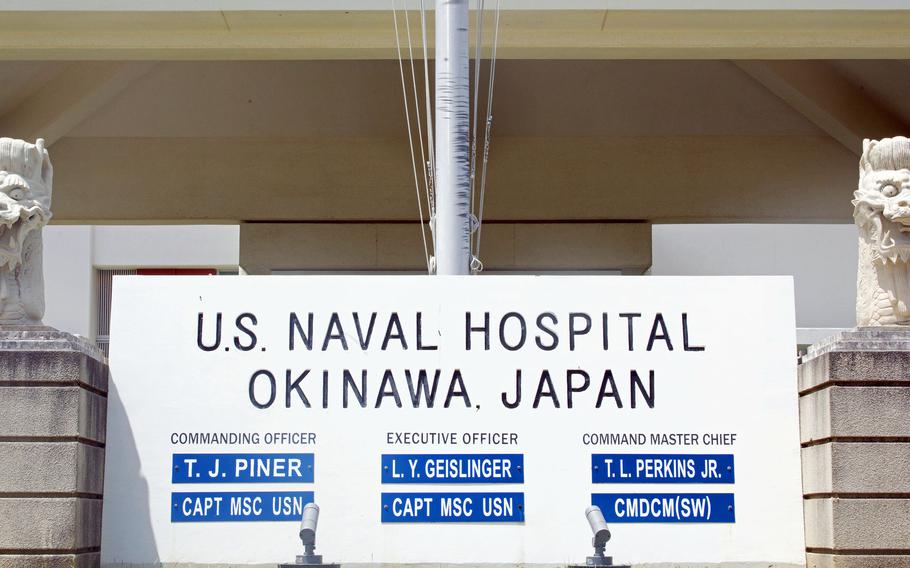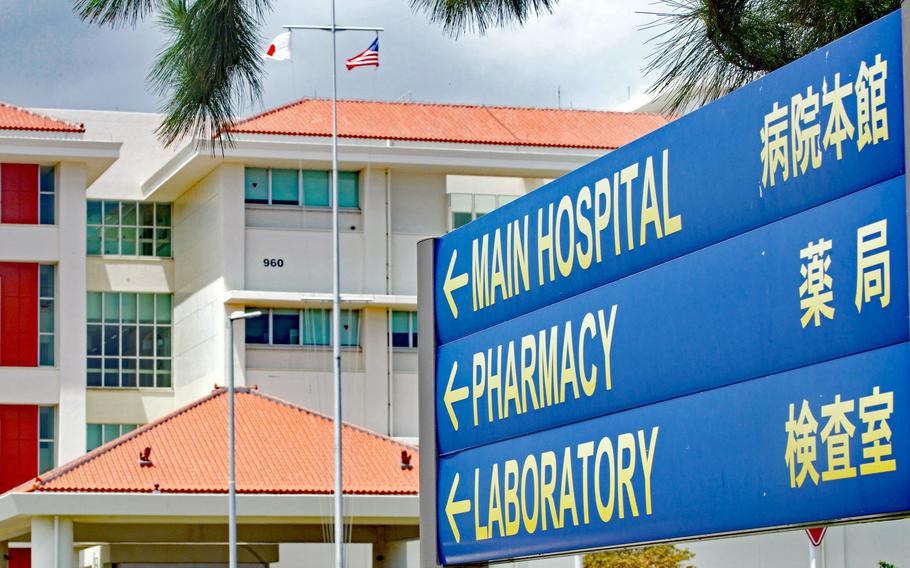
U.S. Naval Hospital Okinawa at Camp Foster is pictured on June 9, 2023. (Frank Andrews/Stars and Stripes)
CAMP FOSTER, Okinawa — The medical clinic at Kadena Air Base reinstated care for expectant mothers in U.S. military families Friday, two days after announcing that those about to give birth should plan to do so elsewhere.
The clinic entered “divert status” on Wednesday due to staffing shortfalls at U.S. Naval Hospital Okinawa, where the obstetrics and gynecology clinic is housed, according to a memo from the 18th Medical Group’s chief of staff, Lt. Col. Travis Russell. Women with due dates between August and December faced returning to military hospitals in the United States or seeking care from off-base doctors.
On Friday, the Defense Health Agency reversed course and restored obstetric services at the naval hospital, according to a post by the agency on the hospital’s official Facebook page.
“Through a collaborative effort on the part of DHA and the medical departments of all military services, Okinawa will continue to provide full labor and delivery services for all beneficiaries” within the Indo-Pacific Command, the post states.
The hospital is not in divert status and is working to fill the gaps with additional military, civilians and contractors, according to the post. A similar post appeared Friday on Kadena Air Base’s official Facebook page.
The staffing shortage was brought on by “the summer permanent change of station cycle and unanticipated early departure of civilian staff,” the post states.

U.S. Naval Hospital Okinawa at Camp Foster is pictured on June 9, 2023. (Frank Andrews/Stars and Stripes)
A hospital spokesman attributed the mixed messaging to miscommunications between the Kadena clinic and the naval hospital.
Kadena Medical Clinic “got out a little ahead of us” Wednesday before the naval hospital could announce that obstetrics services were still available, spokesman Trey Savitz said by phone Friday.
“We can’t control the messaging from other entities,” he said, adding that patients should look to U.S. Naval Hospital Okinawa for “up-to-date, accurate information.”
Shelby Ozier, 21, an Air Force spouse who is 29 weeks pregnant, said she nearly had a “heart attack” after a call Wednesday from her case manager at the Kadena clinic.
She was presented with two “horrible” options: going back to the U.S. without her husband, to an unknown military hospital to give birth, or giving birth in a Japanese clinic without the appropriate pain medicine, which is typical in Japan, she said by phone Friday.
The Illinois-native was leaning toward delivering off base to spare her unborn child the stress of the trip stateside, she said. Her husband, an airman with the 18th Wing, is on a no-contact assignment.
“I’m definitely angry,” she said. “I cried a lot. I stressed myself out so much; when you stress yourself out, you’re stressing out your baby.”
Savitz said the hospital regrets the uncertainty caused by the conflicting messages.
“We hate that our beneficiaries had to go through that stress,” he said.
Kelly Pretorius, a pediatric nurse practitioner and civilian health care advocate from Japan Civilian Medical Advocacy, said she remains concerned about the safety of mothers and babies who are being cared for at U.S. Naval Hospital Okinawa.
“The unexpected departure of civilian staff should not have come as a surprise,” she told Stars and Stripes in an email Friday. “We know stress causes negative health outcomes for mothers and babies; why are we causing more unstable environments for such a vulnerable population, especially among our active-duty families?”